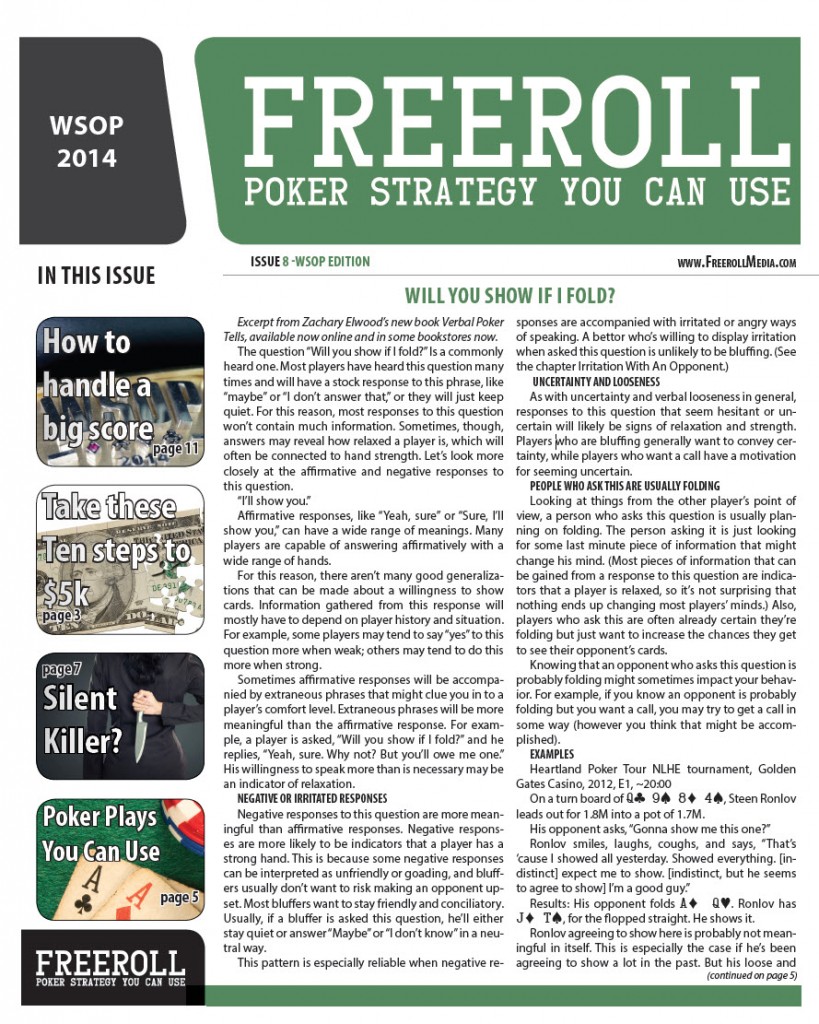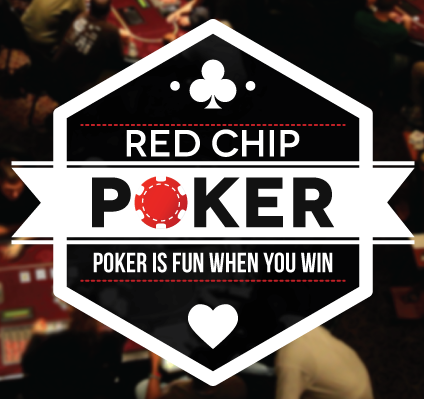Verbal Poker Tells: “Will you show if I fold?”
- By Zach Elwood
- June 7, 2014
- Comments Off on Verbal Poker Tells: “Will you show if I fold?”
Excerpt from Zachary Elwood’s new book Verbal Poker Tells, available now online and in some bookstores
“Will you show if I fold?”
The question “Will you show if I fold?” is a commonly heard one. Most players have heard this question many times and will have a stock response to this phrase, like “Maybe” or “I don’t answer that,” or they will just keep quiet. For this reason, most responses to this question won’t contain much information. Sometimes, though, answers may reveal how relaxed a player is, which will often be connected to hand strength. Let’s look more closely at the affirmative and negative responses to this question.
“I’ll show you.”
Affirmative responses, like “Yeah, sure” or “Sure, I’ll show you,” can have a wide range of meanings. Many players are capable of answering affirmatively with a wide range of hands.
For this reason, there aren’t many good generalizations that can be made about a willingness to show cards. Information gathered from this response will mostly have to depend on player history and situation. For example, some players may tend to say “yes” to this question more when weak; others may tend to do this more when strong.
Sometimes affirmative responses will be accompanied by extraneous phrases that might clue you in to a player’s comfort level. Extraneous phrases will be more meaningful than the affirmative response. For example, a player is asked, “Will you show if I fold?” and he replies, “Yeah, sure. Why not? But you’ll owe me one.” His willingness to speak more than is necessary may be an indicator of relaxation.
Negative or irritated responses
Negative responses to this question are more meaningful than affirmative responses. Negative responses are more likely to be indicators that a player has a strong hand. This is because some negative responses can be interpreted as unfriendly or goading, and bluffers usually don’t want to risk making an opponent upset. Most bluffers want to stay friendly and conciliatory. Usually, if a bluffer is asked this question, he’ll either stay quiet or answer “Maybe” or “I don’t know” in a neutral way.
This pattern is especially reliable when negative responses are accompanied with irritated or angry ways of speaking. A bettor who’s willing to display irritation when asked this question is unlikely to be bluffing. (See the chapter Irritation With An Opponent.)
Uncertainty and looseness
As with uncertainty and verbal looseness in general, responses to this question that seem hesitant or uncertain will likely be signs of relaxation and strength. Players who are bluffing generally want to convey certainty, while players who want a call have a motivation for seeming uncertain.
People who ask this are usually folding
Looking at things from the other player’s point of view, a person who asks this question is usually planning on folding. The person asking it is just looking for some last minute piece of information that might change his mind. (Most pieces of information that can be gained from a response to this question are indicators that a player is relaxed, so it’s not surprising that nothing ends up changing most players’ minds.) Also, players who ask this are often already certain they’re folding but just want to increase the chances they get to see their opponent’s cards.
Knowing that an opponent who asks this question is probably folding might sometimes impact your behavior. For example, if you know an opponent is probably folding but you want a call, you may try to get a call in some way (however you think that might be accomplished).
Examples
Heartland Poker Tour NLHE tournament, Golden Gates Casino, 2012, E1, ~20:00
On a turn board of
Q♣ 9♠ 8♦ 4♠
Steen Ronlov leads out for 1.8M into a pot of 1.7M.
His opponent asks, “Gonna show me this one?”
Ronlov smiles, laughs, coughs, and says, “That’s ‘cause I showed all yesterday. Showed everything. [indistinct] expect me to show. [indistinct, but he seems to agree to show] I’m a good guy.”
Results: His opponent folds A♦ Q♥. Ronlov has J♦ T♠, for the flopped straight. He shows it.
Ronlov agreeing to show here is probably not meaningful in itself. This is especially the case if he’s been agreeing to show a lot in the past. But his loose and extraneous statements are probable indicators that he’s relaxed with the situation.
$1-2 NLHE cash game, witnessed by author
The river board is
8♠ 6♦ 4♠ Q♥ 2♥
The player who had bet the turn now bets $120 into a pot of $150.
I say, “I’ve got a big pair. Will you show if I fold?”
The player says quickly, with a lot of emphasis, “Sure!”
Results: I fold my A♠ Q♠. The player shows Q♦ 8♦, for top two pair.
While this player’s agreeing to show wasn’t likely to be meaningful in itself, his immediate and loose response made me feel confident that he was relaxed.
$2-5 NLHE cash game, witnessed by author
In a 3-way pot, on a river board of
6♦ 4♥ 3♦ K♠ 5♣
a player bets $130 into the $160 pot. Her opponent asks, “Will you show if I fold?”
She laughs in an irritated way and shakes her head emphatically.
Her opponent asks, “No?”
She says, “No” quite sternly.
Results: The player calls. The bettor has 8♦ 7♦, for the nut straight.
A recreational player willing to show irritation in response to this question will usually be strong.
High Stakes Poker, high stakes NLHE cash game, S2 E4, ~10:00
On a river board of
7♣ 4♦ 2♠ J♦ K♥
Sam Farha bets $20,000 into a pot of $22,400. Fred Chamanara considers.
Chamanara and Farha talk a long time as Chamanara thinks. Farha is very talkative and very exuberant. One of their last interactions is this:
Chamanara: “Tell you what; you gonna show your hand to me?”
Farha (immediately, dismissively): “Never, to nobody. But I’ll do some business deal, what do you want me to do? Take five back or…” They continue to talk.
Results: Chamanara folds his 9♠ 9♦. Farha has J♥ 4♥ for two pair.
Farha’s immediate and exuberant negative response to Chamanara’s question makes a bluff unlikely.
2008 WSOP NLHE Main Event tournament, E3, ~20:00
On a river board of
A♠ K♥ J♠ T♣ T♦
Roberto Romanello bets 1,800 into a pot of 1,950.
Greg Geller raises to 6,000. The third player folds.
Romanello considers.
Geller: “Just don’t raise me.”
Romanello: “You show if I pass?”
Geller: “Pardon me?”
Romanello: “You show if I pass?”
Geller: “No.”
Romanello: “One time?”
Geller (shaking head, emphatically): “No.”
After another 25 seconds, Geller says, “Okay, I’ll show.”
Results: Romanello has J♥ J♦ and folds his full house. Geller has K♠ K♣, for the better full house.
Geller’s immediate negative responses to Romanello’s questions could be interpreted as dismissive or rude. This makes it likely he has a strong hand. The strangeness of Geller suddenly stating that he’s changed his mind about showing his cards is probably also a sign of relaxation.
$1-2 NLHE cash game, witnessed by author
I have A♥ K♦ and I’m heads-up with the pre-flop raiser. The flop is
7♦ 5♠ 2♠
I check and he checks behind.
The turn is the T♠. I check and he bets $50 into the $30 pot. I call and am prepared to call many river bets.
The river is the 9♠, putting four spades on the board.
I check and he bets $100 into the $130 pot. I ask, “Will you show if I fold?”
He thinks a bit, looking very uncertain, and says, “Uhhh… yeah, if you fold.” He puts a good amount of emphasis on the “if.”
Results: I fold and he shows A♣ Q♠, for the queen-high flush.
The “uhhh” in this player’s statement made it unlikely he was bluffing. Bluffers don’t like to show uncertainty. Also, his emphasis on the “if” made it seem like he was emphasizing that he wanted a fold; that he’d show only if I folded. Considering how purposefully weak his phrasing seemed to be, I thought it was likely he was actually strong.
Overall, though, just the amount of looseness and modulation in his response are indicators of relaxation. Bluffers usually have an instinct to reply in normal and neutral ways, if they respond at all.


